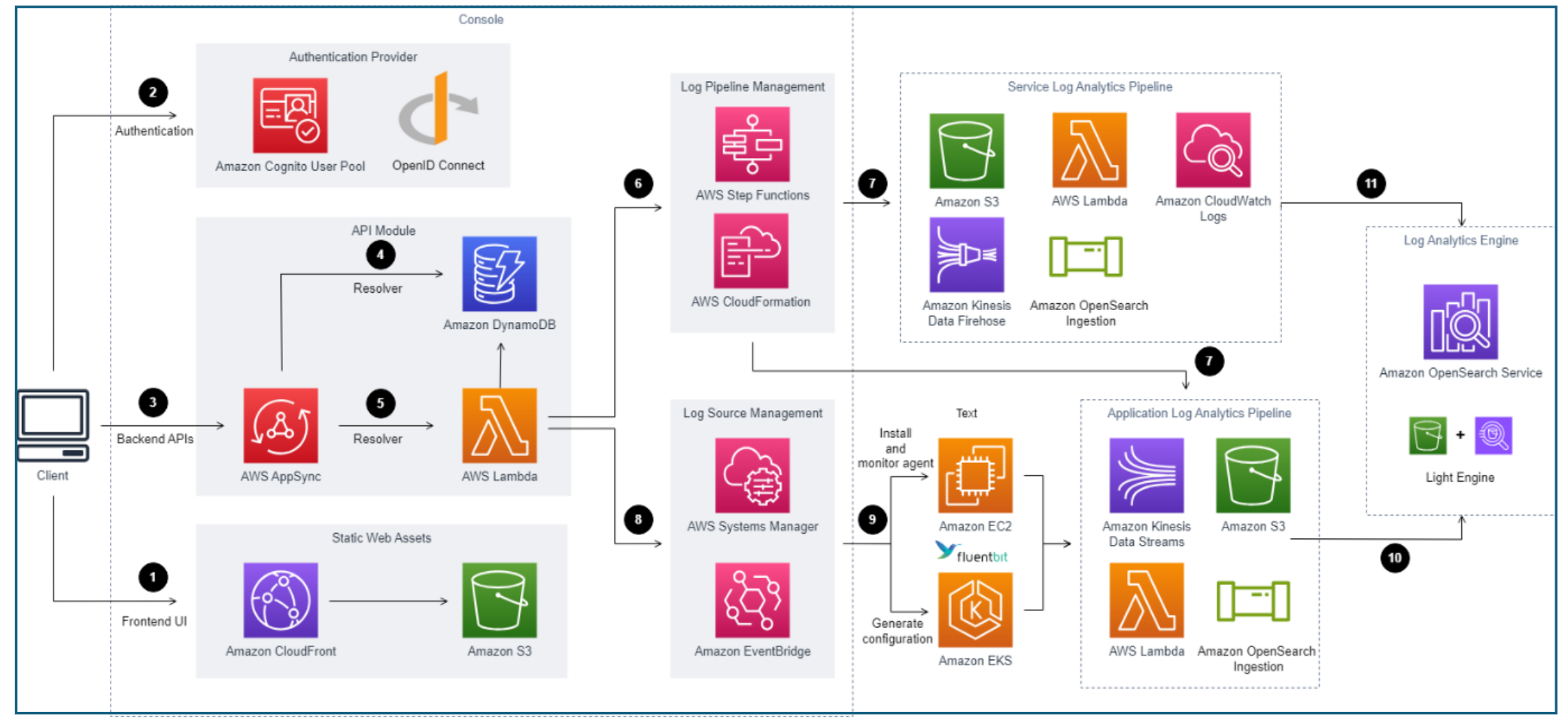In the modern cloud-native landscape, effective log management is essential for monitoring and troubleshooting applications running on Kubernetes clusters like Amazon Elastic Kubernetes Service (EKS). This blog explores the challenges organizations face in managing logs across distributed environments and how centralized logging with OpenSearch transforms log monitoring for EKS applications. We also compare traditional log monitoring tools with centralized monitoring using OpenSearch to highlight the advantages of this innovative solution.
Centralized Logging with OpenSearch for EKS & EC2 Applications: Revolutionizing Log Monitoring
The Problem Statement:
Consider a scenario, A Global logistics company operates multiple microservices on their EKS clusters to manage logistics operations. As the number of services and containers grows, so does the volume and complexity of logs. Additionally, they need to manage logs from various EC2 instances running different components of their infrastructure. Global Logistics company encounters several challenges listed below.
Log fragmentation: Each microservice and EC2 instance generates logs in different formats and locations, making it difficult to aggregate and correlate logs across the EKS environment.
Limited visibility: Without centralized logging, gaining comprehensive visibility into the health and performance of applications is challenging, leading to delays in issue identification and resolution.
Scalability and cost concerns: Traditional log monitoring tools often struggle with the scale of logs generated by modern cloud-native applications, resulting in performance issues and rising costs as data volume increases.
Customer Pain Points with ELK Stack:
Global Logistics company initially implemented an ELK (Elasticsearch, Logstash, Kibana) stack for log monitoring but faced several pain points:
Complex management: Managing the ELK stack requires significant effort, including handling Elasticsearch clusters, ensuring high availability, and managing resource allocation.
Log rotation issues: As log volumes increase, setting up and managing log rotation policies becomes complicated, leading to potential data loss or increased storage costs.
Dedicated infrastructure: Running ELK often requires dedicated EC2 instances, which can become costly and complex to manage as log volumes grow.
Scaling challenges: Scaling Elasticsearch clusters to handle growing log data can be difficult and resource intensive.
User access management: Providing and managing access for individual users within the ELK stack can be cumbersome, requiring meticulous configuration to ensure proper permissions and security.
EC2 instance logs: Collecting and managing logs from multiple EC2 instances adds another layer of complexity, often necessitating additional configuration and resource allocation.
The Solution: Centralized Logging with OpenSearch
To address these challenges, the logistics company adopts centralized logging with OpenSearch for their EKS applications and EC2 instances. Here’s how this solution helps along with the architecture.

Aggregated log collection: OpenSearch provides a centralized platform for collecting, indexing, and storing logs from all containers, services, and EC2 instances running on EKS clusters. This aggregation simplifies searching, analysing, and correlating log data across the entire environment.
Enhanced visibility and monitoring: OpenSearch’s powerful search and visualization capabilities give Logistics company real-time insights into application and infrastructure performance and behaviour. Custom dashboards and alerts enable proactive monitoring, allowing for quick detection and resolution of issues before they impact business operations.
Scalability and cost-effectiveness: OpenSearch’s distributed architecture and horizontal scalability are ideal for handling the high volume of logs from cloud-native applications. By leveraging AWS managed OpenSearch Service, the Logistics company can dynamically scale their log monitoring infrastructure based on demand, benefiting from cost optimizations and operational efficiencies.
How Centralized Monitoring with OpenSearch Solves the Problem:
Unified log collection: OpenSearch unifies log collection from EKS clusters and EC2 instances, eliminating the fragmentation seen with separate systems and providing a single source of truth for log data.
Simplified management: OpenSearch reduces the complexity of managing multiple log sources and the associated infrastructure, offering a managed service that simplifies maintenance and scaling.
Cost efficiency: With built-in scalability and cost optimizations, OpenSearch helps manage expenses better than maintaining dedicated EC2 instances for an ELK stack, which can become increasingly costly as log volumes grow.
Improved user access control: OpenSearch offers streamlined user access management, allowing administrators to easily configure and manage user permissions, enhancing security and operational efficiency.
Seamless integration: OpenSearch integrates seamlessly with AWS services and tools commonly used in Kubernetes environments, such as Amazon CloudWatch and AWS Lambda, simplifying workflows and enhancing overall observability.
Comparing Existing Log Monitoring Tools with OpenSearch:
Scalability: Traditional log monitoring tools like the ELK stack may struggle to scale with the growing log volumes of cloud-native applications. OpenSearch’s distributed architecture ensures scalability and performance, efficiently handling large log data volumes.
Cost: OpenSearch is a cost-effective solution for log monitoring, especially when deployed on AWS managed OpenSearch Service, which offers built-in scalability and cost optimizations. In contrast, ELK stacks can have higher costs due to the need for dedicated EC2 instances, increased storage for logs, and infrastructure maintenance.
Flexibility and customization: OpenSearch allows for customization and extension to meet specific requirements. It supports various log shipping agents and integrations, offering flexibility and interoperability with existing toolchains. ELK stack management can be more rigid and complex, requiring specialized knowledge for effective customization.
Ecosystem integration: OpenSearch integrates seamlessly with other AWS services and tools commonly used in Kubernetes environments, such as Amazon CloudWatch and AWS Lambda. This native integration streamlines log monitoring workflows and enhances overall observability. The ELK stack, while powerful, often requires additional effort to achieve similar levels of integration with AWS services.
Conclusion:
Centralized logging with OpenSearch is a game-changer for organizations like Logistics and other sectors, offering a scalable, cost-effective, and flexible solution for monitoring EKS applications and EC2 instances. By aggregating logs, enhancing visibility, and improving scalability, OpenSearch provides actionable insights into application performance and behaviour, enabling faster issue resolution and improved operational efficiency. Compared to traditional log monitoring tools like the ELK stack, OpenSearch excels in scalability, cost-effectiveness, flexibility, and ecosystem integration, making it the preferred choice for modern cloud-native environments.
Written by

Mahavishnu Govindaraj
Tech Manager - AWS DevOps and Security Specialist

Umashankar N
Chief Technology Officer (CTO) and AWS Ambassador

